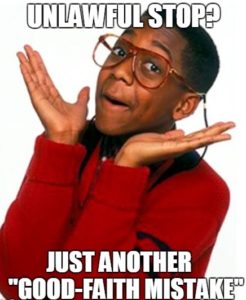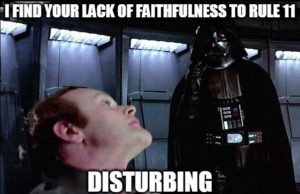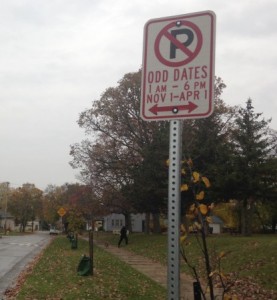In today’s United States v. Richards, the Second Circuit emphasized the importance of strictly adhering to Federal Rule of Criminal Procedure 32(i)(1)(A), which requires a judge to “verify that the defendant and the defendant’s attorney have read and discussed the presentence report and any addendum to the report.” The Circuit implied that, where the “discussion” is not confirmed, raising that issue on appeal may require reversal.…
Author Archive | Matt Larsen
Supreme Court Again Excuses “Unconstitutional Police Conduct”
In yesterday’s Utah v. Strieff, five of the eight members of the Supreme Court held the existence of an arrest warrant for someone a police officer unlawfully stops sufficiently “attenuates” the taint of the illegal stop, at least where the stop is not “flagrantly” unconstitutional.
Based on an anonymous tip, a South Salt Lake City police detective conducted “intermittent surveillance” of a house to see if it was being used to sell drugs. He saw people leave “a few minutes after arriving at the house,” and this “raise[d] his suspicion that the occupants were dealing drugs.” One day he saw Strieff leave the house; he followed Strieff on foot and stopped him. When he got Strieff’s ID card and relayed the information to a colleague, he discovered “Strieff had an outstanding arrest warrant for a traffic violation.” The detective then arrested Strieff and searched him, finding drugs in his …
Nothing relevant from the Second Circuit today.
Nothing relevant from the Second Circuit today.…
Nothing of Relevance From The Second Circuit Today
Second Circuit “Disturb[ed] That District Courts Do Not Routinely Follow” Rule 11
Today in United States v. Pattee, the Second Circuit (Calabresi, Lynch, Lohier, CJJ.) found it “disturbing that district courts do not routinely follow the minimal procedures put in place to protect defendants’ rights.”
In accepting a guilty plea to producing, distributing and possessing child pornography, the district court (Geraci, Ch.J.) failed to advise the defendant of “five of the approximately fifteen rights” listed in Federal Rule of Criminal Procedure 11. The Circuit found this troubling, as the “Court has stated time and again that [w]e have adopted a standard of strict adherence to Rule 11” and that “compliance with Rule 11 is not a difficult task” because “errors can be avoided if a district or magistrate judge has a standard script for accepting guilty pleas. . . . Yet failures to meet those requirements are a recurring issue.” The Court further cautioned that “even strict adherence to Rule 11 …
Johnson is Retroactive
In last year’s Johnson v. United States, the Supreme Court held the residual clause of the Armed Career Criminal Act (ACCA) void for vagueness.
In today’s Welch v. United States, the Supreme Court held Johnson applies retroactively. Only Justice Thomas dissented.
This means defendants serving final sentences — meaning ones previously affirmed on appeal — are now eligible for relief if they were sentenced under ACCA’s residual clause. This is true even if they’re arguably subject to ACCA’s force/elements clause: though the government’s position was that Mr. Welch merits no relief because his prior conviction for Florida robbery falls under that clause, the Court said that’s debatable and remanded the case for further proceedings.
The question lurking in the shadows here, which Welch didn’t address, is whether Johnson also has the effect of retroactively invalidating the residual clauses of the Career Offender Guideline, 18 U.S.C. § 16, 18 …
Supreme Court: Pretrial Restraint of Untainted Assets Needed to Hire a Lawyer is Unconstitutional
No opinions or relevant summary orders from the Second Circuit today.
Operating with only 8 justices, a fractured Supreme Court today decided Luis v. United States. The Court’s holding is that “pretrial restraint of legitimate, untainted assets needed to retain counsel of choice violates the Sixth Amendment.”
Justice Breyer’s plurality opinion, joined by Chief Justice Roberts and Justices Ginsburg and Sotomayor, explains that 18 U.S.C. § 1345 generally authorizes the government to freeze the assets of people accused of federal banking or health-care crimes. Specifically, § 1345(a)(2)(B)(i) authorizes the pretrial restraint of “property of equivalent value,” meaning property that is neither “obtained as a result of” nor “traceable to” the alleged crime.
This license to freeze “property that is untainted by the crime, and that belongs fully to the defendant,” violates the Sixth Amendment if such funds (in Luis’s case, some $2 million) are needed to hire counsel of …
Woe Betide Those Who Park on the Wrong Side of the Street (and those who produce child pornography)
No relevant opinions today; two summary orders.
In United States v. Grady, Syracuse police noticed that Grady’s car was parked in violation of the city’s odd/even street parking rules. They approached the car, shone their flashlights inside and saw, in plain view, a bag of crack cocaine on Grady’s lap. A loaded gun was also found in the car.
Assuming the officers’ approach of the car constituted a stop, the Court (Jacobs, Hall, Lynch, CJJ) held there was reasonable suspicion given the car’s being parked on the wrong side of the street. Though a car isn’t “parked” if it’s stopped only to load or unload goods or passengers, the officers observed no such activity and the Court held they watched the car for long enough — 10 seconds — before deciding to approach. “The officers were not required to conduct surveillance long enough to ‘rule out the possibility of …
Categories: car stop, child pornography, expert witnesses, Fourth Amendment, reasonable suspicion, substantive reasonableness







